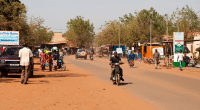The French Development Agency (AFD) is financing the creation of a network of cities in Africa around the challenges of "smart city". It has entrusted the National Agency for Urban Renewal (dubbed ANRU in French) with the implementation of this project, which will benefit 12 African cities across the continent. A referent expert is being recruited.
What can be done to advance thinking on smart city in Africa? The French Development Agency (AFD), mobilised on the issue of digital transition for urban development, has decided to finance the creation of a network of African cities around the challenges of smart cities, called ASToN (African Smart Towns Network). The bank has called on the National Agency for Urban Renewal (ANRU) to implement this project. This French establishment, located in Paris, is also responsible for managing the European URBACT programme in Europe, whose method it will use here.
The aim is to develop local, integrated and participatory urban projects through exchange with other cities, transfer of good practices, peer review, capacity building of local actors and expertise. To this end, the cities will be supported by a referent expert and ad hoc experts. Applications to apply for the position of Lead Expert on this project will run from April 16 to May 20, 2019.
The objective of the ASToN project is to support the digital transition of African local authorities by setting up a network of cities. ASToN’s intentions and activities will be similar to those of an URBACT network. On the basis of a call for applications, AFD and ANRU selected 12 cities in 12 different countries: Algiers (Algeria), Bamako (Mali), Benguérir (Morocco), Bizerte (Tunisia), Kampala (Uganda), Kigali (Rwanda), Kumasi (Ghana), Lagos (Nigeria), Maputo-Matola (Mozambique), Niamey (Niger), Nouakchott (Mauritania) and Sèmè-Kpodji (Benin).
The ASToN network will therefore involve French, English and Portuguese-speaking cities. Out of the 12 applications selected, seven of them identify e-administration issues (data management, dematerialisation, e-tax system, land management, etc.) and five others concern the digitisation of urban services (mobility and waste control).
Stages of ASToN project activities
The activities of the Aston network will be carried out in four phases, aligned with the calendar of Action Planning Networks (APNs) of the European URBACT programme.
A so-called “zero” phase of preparation and launch specific to ASToN (from April to August 2019). A first step (phase 1) to develop a baseline study and network methodology (September 2019 to February 2020). A second phase of work (phase 2) on integrated action plans with local groups (March 2020 to August 2021), with transnational meetings and exchanges. A third and final stage (phase 3) of implementation of pilot projects and/or experimentation in the various cities (from September 2021 to February 2022). These phases will be completed by a final evaluation (March to April 2022).
Yasmin Rico
→ There is a practical guide (in French and English) to support local authorities in meeting the challenge of the digital transition with all the city’s stakeholders: http://smartcity-guide.afd.fr
→ The call for applications for the position of referent expert is available here (in French): https://urbact.eu/sites/default/files/aston_appel_a_candidatures_expert_referent_en.pdf







